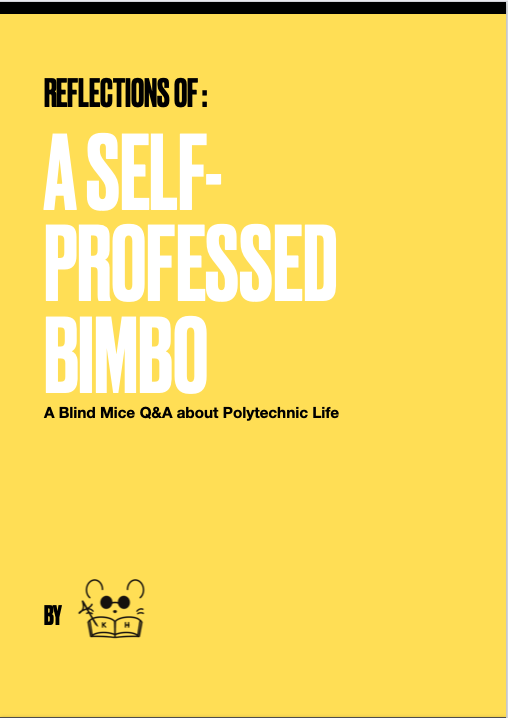Disclaimer:
KH is a polytechnic graduate who is currently studying at Yale-NUS College. She would like to add that the information presented is solely based on her personal experience and research. All advice given is in no way representative of the views of any institutions.
5 Misconceptions That I Had As A Poly Student:
Year 1 KH: Getting into a local university is 100% about GPA. I can secure a spot as long as my GPA is well above the cut-off point.
Graduated KH: That’s true to a certain extent until it’s not. Getting a high GPA is the sensible thing to do to almost guarantee you a spot, but there are always exceptions. This has happened to many of those around me: they were at least 0.1 points above the 10th percentile’s GPA, yet they didn’t gain admission. I think it’s important to understand that the 10th percentile gauge is very loose.
Your GPA has to complement your extra-curricular activities. You need to show university admission teams that you have a life outside of the classroom, and that you’re good at choosing things to participate in. Show that these activities add value to your course of study. You don’t need many, but you need enough to write a story in the essay component. (BTW: Fill in the aptitude-based admissions section even if you have a 4.0!! No harm!!) This is especially relevant for university courses in the arts and social sciences.
Year 1 KH: My choice of a university course is dependent on my polytechnic course.
Graduated KH: YOU’RE WRONG! (Unless you’re aiming to be a doctor or lawyer etc., where a specialised degree is needed.)
I initially wanted to be a journalist, so I was hell-bent on getting into Communication Studies at NTU. It took me awhile to realise that pursuing a similar course of study in university meant that I would be studying something similar for four more years. This didn’t appeal to me, since I prefer ‘breadth’ to ‘depth’. I became more open-minded and found that arts and social sciences are very interdisciplinary. A senior of mine is a journalist at Channel NewsAsia. Instead of taking Communication Studies, he majored in Southeast Asian Studies at NUS because he knew he wanted report on Southeast Asian issues. His degree complements his career and what he studied in polytechnic. Being more ‘adventurous’ also opens new doors!
However, if you have a core and niche interest that you have recognised since prior to polytechnic and you love going in-depth, I highly recommend continuing pursuing that in university! 🙂
*Some polytechnic courses also do not qualify for some university courses. Check out the university websites to find out the requirements!
Year 1 KH: Only the top 10% of polytechnic graduates get into a local university.
Graduated KH: This myth that came from our parents’ generation is totally false! Your grades, progress, personal growth and story do not weigh less than a gold medallist, as long as the university finds you suitable. Being in the top 10% of a course only defines your standing in that course. However, there might be a student from another course with a higher GPA that will gain admission instead, despite not being in the top 10%!
I personally know of a diploma with merit holder who did not get uni admissions while my non-merit holder friend did. It’s all about perspective.
SO DO NOT WORRY OR STRESS IF THERE ARE PEOPLE AHEAD OF YOU, YOU ARE DOING GREAT!!
Year 1 KH: I am not doing well enough in polytechnic – I am going to transfer to a JC to increase my university chances.
Graduated KH: This is a solution thought to be very practical…again, during our parents’ time! I do not believe that being in a polytechnic today puts you at a large disadvantage for most university courses. Not all JC students make it to university either! In a junior college, you will probably want to aim for 75 rank points (out of 90) to get into a university, and that is probably as ambitious as getting a 3.7 in a polytechnic. Don’t listen to the stereotypes!! It is not any easier in Junior College. You have to hustle anywhere!!
You might have to ‘prove your worth’ beyond just your GPA if you come from a polytechnic, but being a polytechnic student really makes you different. It gives you industry-relevant skills and internships that junior college students might not have. I find that by coming from a polytechnic, I have a more unique story to tell too.
Year 1 KH: It’s hard to maintain a good GPA.
Graduated KH: Yes it is, I will not deny that. GPA is fluid and can change dramatically each semester. What helped me to ‘maintain’ my GPA was to just be accountable! I think it is part of studying smart.
Tools such as the FBM GPA Calculator helped me to stay on track. I was motivated enough to keep to my intended GPA so I was a bit more mindful about the number of A’s I was getting. When I knew I had little time and had to choose between two modules, I would ditch the one I felt I had lesser chances of attaining an A / that had lesser credit units. I think it’s easy to accuse yourself or seem as if you’re being half-hearted, but I will be “that person” and say that it is just being real and making tough choices. Nothing wrong with that.
But at the same time, NEVER be grade-conscious. You can keep track of your grades to help maintain your GPA, but do not use it as the tool to bring you down or up!! Chasing after the slightest decimal can become toxic. Seek experiences, not letters!
Experiences That Changed My Polytechnic Life
When I started to get my act together, I began taking any opportunity that came my way. My co-curricular activities look incredibly random at first glance. It looks lacking in direction. Some of them include:
- Finalist at a photography competition
- Youth Model ASEAN Conference (YMAC)
- Community Centre Volunteer
- Photographer on a television film set
- Environmental project
- Singapore Model Parliament (SMP)
- Photojournalism internship
I was glad that I took up all these activities, but when it came to writing the essays, I didn’t know how to bring them all together. I had a difficult time doing my application.
However, I managed to weave my different experiences into one collective story about me!
Main gist: Always ask yourself the motivation behind doing these activities.
Why did I do photography-centric and volunteer activities? They’re both so different.
I dug deep and found that I did not like just taking pretty photos. I took photos because I had a genuine interest in society, people and their stories. Taking photos meant that I could a spark conversation with them to get to know them better. I translated this experience and reflection into my essays.
With my deep interest in people, I was motivated to get involved by going on the ground! I began volunteering, helping needy residents on a weekly basis. Volunteering further fueled my desire to help others while growing my fascination around interacting with different communities.
Why did I attend more ‘academic’ programmes like YMAC and SMP?
Academic programmes initially seemed off-brand for me because I am quite ditzy. To me, academics meant my course work and that was it. But a wise birdie reminded me that getting into university essentially means getting into a more rigorous academic programme, and that was something that I could not change. So…no matter whether you like it, get involved!!
The experience was refreshing to me and I started matching the conceptual knowledge I took away from these programmes with my own personal experiences. YMAC and SMP taught me a lot about policy work, which I connected with my understanding of people (that I had gained from other experiences).
How about the other random projects?
The other experiences tell stories of my character. They don’t necessarily go hand in hand with my interests, but it says a lot about the kind of person I am. For example, the environmental project did not go as my friends and I had hoped, but we stuck through it for a long time even when our mess hit the fan. It told a story of resilience!
When you think of your motivation behind these activities, you will naturally be able to connect the dots and weave these experiences together to tell your own unique story. It takes time but it’s definitely there — unless you genuinely regret participating in some programmes, in which case, you can omit them.


